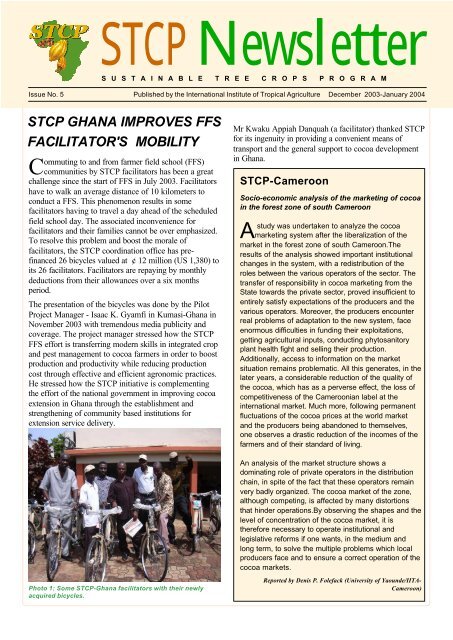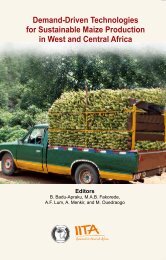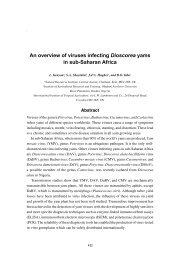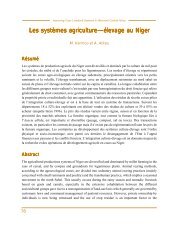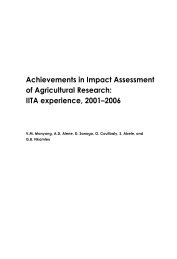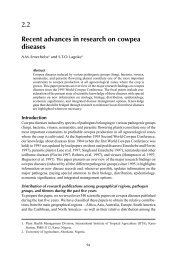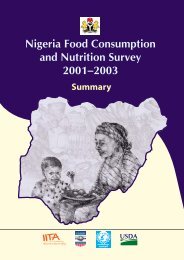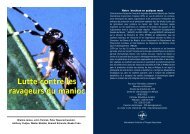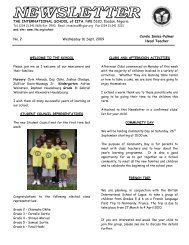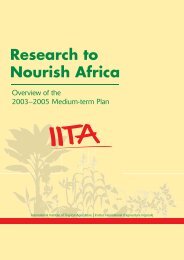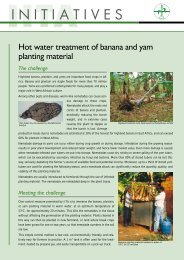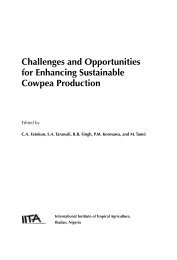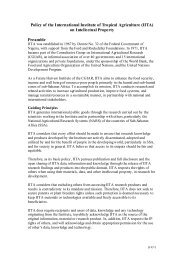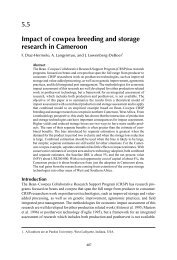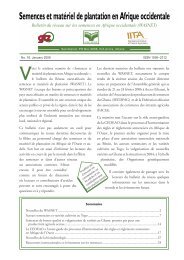STCP - IITA
STCP - IITA
STCP - IITA
Create successful ePaper yourself
Turn your PDF publications into a flip-book with our unique Google optimized e-Paper software.
<strong>STCP</strong> Newsletter<br />
S U S T A I N A B L E T R E E C R O P S P R O G R A M<br />
Issue No. 5 Published by the International Institute of Tropical Agriculture December 2003-January 2004<br />
<strong>STCP</strong> GHANA IMPROVES FFS<br />
FACILITATOR'S MOBILITY<br />
Commuting to and from farmer field school (FFS)<br />
communities by <strong>STCP</strong> facilitators has been a great<br />
challenge since the start of FFS in July 2003. Facilitators<br />
have to walk an average distance of 10 kilometers to<br />
conduct a FFS. This phenomenon results in some<br />
facilitators having to travel a day ahead of the scheduled<br />
field school day. The associated inconvenience for<br />
facilitators and their families cannot be over emphasized.<br />
To resolve this problem and boost the morale of<br />
facilitators, the <strong>STCP</strong> coordination office has prefinanced<br />
26 bicycles valued at ¢ 12 million (US 1,380) to<br />
its 26 facilitators. Facilitators are repaying by monthly<br />
deductions from their allowances over a six months<br />
period.<br />
The presentation of the bicycles was done by the Pilot<br />
Project Manager - Isaac K. Gyamfi in Kumasi-Ghana in<br />
November 2003 with tremendous media publicity and<br />
coverage. The project manager stressed how the <strong>STCP</strong><br />
FFS effort is transferring modern skills in integrated crop<br />
and pest management to cocoa farmers in order to boost<br />
production and productivity while reducing production<br />
cost through effective and efficient agronomic practices.<br />
He stressed how the <strong>STCP</strong> initiative is complementing<br />
the effort of the national government in improving cocoa<br />
extension in Ghana through the establishment and<br />
strengthening of community based institutions for<br />
extension service delivery.<br />
Mr Kwaku Appiah Danquah (a facilitator) thanked <strong>STCP</strong><br />
for its ingenuity in providing a convenient means of<br />
transport and the general support to cocoa development<br />
in Ghana.<br />
<strong>STCP</strong>-Cameroon<br />
Socio-economic analysis of the marketing of cocoa<br />
in the forest zone of south Cameroon<br />
Astudy was undertaken to analyze the cocoa<br />
marketing system after the liberalization of the<br />
market in the forest zone of south Cameroon.The<br />
results of the analysis showed important institutional<br />
changes in the system, with a redistribution of the<br />
roles between the various operators of the sector. The<br />
transfer of responsibility in cocoa marketing from the<br />
State towards the private sector, proved insufficient to<br />
entirely satisfy expectations of the producers and the<br />
various operators. Moreover, the producers encounter<br />
real problems of adaptation to the new system, face<br />
enormous difficulties in funding their exploitations,<br />
getting agricultural inputs, conducting phytosanitory<br />
plant health fight and selling their production.<br />
Additionally, access to information on the market<br />
situation remains problematic. All this generates, in the<br />
later years, a considerable reduction of the quality of<br />
the cocoa, which has as a perverse effect, the loss of<br />
competitiveness of the Cameroonian label at the<br />
international market. Much more, following permanent<br />
fluctuations of the cocoa prices at the world market<br />
and the producers being abandoned to themselves,<br />
one observes a drastic reduction of the incomes of the<br />
farmers and of their standard of living.<br />
An analysis of the market structure shows a<br />
dominating role of private operators in the distribution<br />
chain, in spite of the fact that these operators remain<br />
very badly organized. The cocoa market of the zone,<br />
although competing, is affected by many distortions<br />
that hinder operations.By observing the shapes and the<br />
level of concentration of the cocoa market, it is<br />
therefore necessary to operate institutional and<br />
legislative reforms if one wants, in the medium and<br />
long term, to solve the multiple problems which local<br />
producers face and to ensure a correct operation of the<br />
cocoa markets.<br />
Photo 1: Some <strong>STCP</strong>-Ghana facilitators with their newly<br />
acquired bicycles.<br />
Reported by Denis P. Folefack (University of Yaounde/<strong>IITA</strong>-<br />
Cameroon)
Eye Witness Stories!<br />
ELAT (CAMEROON):<br />
The Farmer Field School (FFS) of ELAT village<br />
(south of Yaoundé) had 23 participants during the<br />
2003 training cycle. After the cycle’s closure (in<br />
December), the facilitator organized a round in the fields<br />
of the 23 participants, in an individual way, to observe<br />
the degree of application of the techniques learned at the<br />
school sessions. She recorded some impact stories:<br />
• A farmer-participant passed from 46 sachets of<br />
fungicides applied last year to 18 sachets this year on his<br />
3 hectares farm. Contrary to the other FFS participants<br />
who tried out the school techniques on 100, 200 or 300<br />
trees in their fields, he applied these techniques on his<br />
entire farm; carrying out he says "one of best harvests in<br />
terms of quantity this year with a good remainder of<br />
fungicides at home".<br />
• Another farmer, also of the same school stated:<br />
“I have carried out fungicide treatment just once after<br />
having applied the FFS techniques in a sub-plot of my<br />
farm instead of 8 times as in the previous years”.<br />
(Reported by Simon Bassanaga, <strong>STCP</strong>-Cameroon)<br />
AKATANIASE (GHANA):<br />
Hanna Owusu and Dominic, both facilitators,<br />
established their FFS in Akataniase in June 2003.<br />
Farmers saw the usefulness of their training and carried<br />
the news around. Madam Margaret Boaye who lives in<br />
Koben benefited from the training and recounts her<br />
experience as follows:<br />
“My husband and I have a-three-acre cocoa farm<br />
established six years ago.We have been doing our best<br />
in managing the farm but have not been able to harvest<br />
a bag of cocoa from the farm.I requested Hanna to go<br />
along with us to the farm for diagnosis and subsequent<br />
prescription of a remedy.<br />
We observed that: there were a lot of chupons all over<br />
the farm, a lot of trees per stand (3-4 trees/stand),<br />
thining has not been done and lot of termitaria in the<br />
farm.<br />
Hanna discussed the problems identified in the farm<br />
with me and we decided to do some field<br />
exercises.We worked from 9.30 am to 13.30 GMT to<br />
cover half acre farm.We cut the chupons, reduced the<br />
number of stems to one each, removed all the left-over<br />
diseased pods on the trees. My husband could not do<br />
the maintenance because he thought he would be<br />
causing harm to the farm by reducing the population.<br />
After the day's work he agreed to continue with the<br />
rest of the work”.<br />
Information reaching Hanna stated that there are a lot<br />
of flowers and cherelles of which they are hoping for<br />
an increase in yield. The in-law has therefore invited<br />
her to organize a field school in the village. She is<br />
willing to attend the FFS to enable her to harvest more<br />
to take care of her family.<br />
BONTOMURUSO (GHANA):<br />
Achieftancy dispute divided the villagers of<br />
Bonomuruso into two distinct camps. Members of<br />
both camps did not want to sit together in the same<br />
class of a Farmer Field School proposed for the<br />
village. Through persistent education, they realised<br />
chieftancy does not provide income to villagers.<br />
Some registered to participate in the FFS and with<br />
time, the others joined them. Now the two factions<br />
have been brought together by the FFS and tensions<br />
have eased dramatically in the village. Some of them<br />
have been able to train other farmers like the case of<br />
Auntie Grace who has trained two farmers on how to<br />
prune and thin their farms<br />
Reported by Sylvanus K. Agordorku (<strong>STCP</strong>-Ghana)<br />
<strong>STCP</strong> GOT A GOOD GIFT FOR THE NEW YEAR FROM ONE<br />
OF THE MAIN COCOA FUNDS IN COTE D'IVOIRE<br />
The <strong>STCP</strong> Pilot of Cote d’Ivoire signed a 500,000 dollars<br />
(273,8 millions CFA F) convention with FDPCC, one of<br />
the main cocoa Funds of the country, over a period of 12<br />
months. Almost 200,000 dollars out of the total amount<br />
of the convention will be handled directly by <strong>IITA</strong>/<strong>STCP</strong>.<br />
The convention aims at contributing to the funding of the<br />
activities already initiated by the <strong>STCP</strong> Pilot Project,<br />
mainly the Farmers Field School and technology Transfer<br />
activities. FDPCC’s main interest for this first phase of the<br />
pilot activities is on the FFS and the cocoa farms<br />
regeneration.<br />
The convention was signed by Mr. Theophile Kouassi<br />
(Executive Secretary of FDPCC) and Robert Yapo<br />
Assamoi (<strong>STCP</strong> Pilot Project Manager) on December 9,<br />
2003, in the <strong>STCP</strong> Pilot Project office (Photo 2). The<br />
signature ceremony was largely covered by the Ivorian<br />
main media (television, Radios, Press, etc).<br />
Photo 2: Executive Secretary of FDPCC (on the right) and<br />
<strong>STCP</strong> Pilot Project Manager (on the left) during the signing<br />
ceremony.<br />
Reported by Robert Yapo Assamoi
STEERING COMMITTEE SATISFIED<br />
The Regional Steering Committee of <strong>STCP</strong> held its annual<br />
meeting in Accra on October 12, 2003 to initiate<br />
discussion on the emerging achievements in Year One of<br />
the <strong>STCP</strong> Pilot Phase and review the workplans for Year<br />
Two. The 16 Steering Committee members, who included<br />
the National Network Coordinators of the 5 <strong>STCP</strong> countries,<br />
were supported in their deliberations by resource persons<br />
from industry, trade, producers, donors, and international<br />
institutions.<br />
A new round of FFS will start between January and<br />
March, with emphasis on ensuring high quality and<br />
monitoring the impact of farmer training. Schools will<br />
be implemented in an action research mode to develop<br />
best bet practices. The new year will kick off with a<br />
regional evaluation and training workshop for master<br />
trainers and supervisors (January 7-16) followed by<br />
national level post-mortem workshops for facilitators.<br />
The Committee was satisfied with the progress of the<br />
program, particularly also in the area of technology and<br />
knowledge dissemination. A key outcome was the agreement<br />
by all partners of <strong>STCP</strong> to assist in the identification<br />
of additional national and international resources to secure<br />
the continued implementation of the <strong>STCP</strong> Action Plan.<br />
Reported by Dr. S. Weise (<strong>STCP</strong> Program Manager)<br />
2003 Farmer field schools wind down as<br />
preparations are made for a new cycle of<br />
schools<br />
One hundred and sixty farmer field schools (FFS)<br />
initiated by <strong>STCP</strong> pilot projects in Cameroon,<br />
Nigeria, Ghana and Côte d'Ivoire are preparing to wind<br />
down activities and graduate their first classes. FFS<br />
improve cocoa farmers' knowledge and decision-making<br />
capacity through discovery-based learning (Photos 3 and<br />
4). During the first year of field schools, the focus has<br />
been on training of facilitators and validation of the<br />
curriculum. The FFS curriculum covers the following<br />
topics: IPM, cocoa agronomy, post-harvest management,<br />
regeneration, agro-ecosystem analysis, economic<br />
analysis, child labour and non-formal education. FFS in<br />
the four countries have trained approximately 4260 cocoa<br />
farmers since May and most will officially end their cycle<br />
by December. To enable 2003 participants to benefit<br />
from the full curriculum, 'remedial' sessions will be<br />
offered periodically during 2004. In all countries, the FFS<br />
program received an overwhelmingly positive response.<br />
Photo 4: Disease zoo exercise by FFS participants, Cote<br />
d’Ivoire, September 2003.<br />
In 2004, field schools will focus on a few key<br />
production constraints, namely, disease and pest<br />
management, regeneration and post-harvest<br />
management, with slightly different emphases by<br />
country. A focused curriculum will improve the costeffectiveness<br />
of the FFS approach, thereby making it<br />
more amenable to scaling up.<br />
In Year two (2003-2004), the curriculum will include a<br />
second social issue: HIV/AIDS awareness. Surveys<br />
will be conducted among FFS graduates to assess the<br />
impact of farmer training.<br />
Reported by Dr. Soniia David (<strong>STCP</strong>-Participatory Extension<br />
Specialist)<br />
Photo 3: Training of trainers workshop, Cameroon, August<br />
2003.
Nigerian <strong>STCP</strong><br />
Stakeholders Meet<br />
ANigerian Sensitization Meeting for the Sustainable<br />
Tree Crops Program (<strong>STCP</strong>) was held at <strong>IITA</strong> on<br />
Friday 25 October to discuss the use of spatial data for<br />
the project and to facilitate discussion among various<br />
stakeholders. About 20 participants attended, including<br />
<strong>STCP</strong> staff, local partners, <strong>IITA</strong> scientists and<br />
representatives from the United States Geographical<br />
Survey (USGS).<br />
The workshop was opened by Dr Chris Okafor, who<br />
welcomed all participants and provided an overview of<br />
the scope and purpose of the <strong>STCP</strong> pilot projects. Chris<br />
Legg then presented information on <strong>IITA</strong>'s use of<br />
geographic information systems (GIS) and global<br />
positioning systems (GPS) for the purposes of collecting<br />
geo-spatial data, and the possibilities for its use within<br />
<strong>STCP</strong>. Discussion followed on activities related to cocoa<br />
production and spatial data collection within Nigeria, and<br />
how information technology could be used to improve<br />
information flow between farmers and markets.<br />
In the afternoon, USGS representatives, Eric Wood and<br />
Michael Cohen, shared examples of similar projects<br />
which successfully utilized information technology, and<br />
then discussed <strong>STCP</strong> experiences in spatial data<br />
collection and dissemination with special focus on the<br />
pilot project in Cameroon. The day closed with a dialogue<br />
on current issues and challenges facing stakeholders, and<br />
possible next steps for the Nigerian pilot project in the<br />
Akure area (Ondo State) were outlined.<br />
Lesley Abraham, Communication and Information Services,<br />
<strong>IITA</strong><br />
About <strong>STCP</strong><br />
The Sustainable Tree Crops Program (<strong>STCP</strong>)<br />
constitutes a coordinated and innovative effort<br />
made by farmers and producer organizations,<br />
industry and trade, national governments, research<br />
institutes, the public sector, policymakers, donors<br />
and development agencies to facilitate the<br />
improvement of smallholder agricultural systems<br />
based on tree crops in West and Central Africa.<br />
Collectively, this coalition of partners, have shaped<br />
consensus around four common interests and<br />
concerns. They include: 1) promoting the production<br />
and marketing of quality tree crop products, 2)<br />
improving market access and income for small-scale<br />
producers, 3) creating systems that are<br />
environmentally friendly, socially responsible, and<br />
economically sustainable, and 4) developing an<br />
integrated Action Plan initially targeting cocoa,<br />
cashew nuts, and associated tree crops, in<br />
Cameroon, Côte d’Ivoire, Ghana, Guinea and Nigeria.<br />
The goal of <strong>STCP</strong> is to improve the economic and<br />
social well-being of smallholders and the<br />
environmental sustainability of tree crop farms of<br />
West and Central Africa.<br />
CONTACTS:<br />
This is the quarterly Newsletter of the Sustainable<br />
Tree Crops Program for West and Central Africa,<br />
produced by the Regional Office in Yaounde,<br />
Cameroon. The <strong>STCP</strong> Management would welcome<br />
any contributions/suggestions.<br />
E-mail: stcp-wca@cgiar.org<br />
Fax:<br />
Mail:<br />
(+237) 223 74 37 OR<br />
<strong>STCP</strong> Regional Office, c/o <strong>IITA</strong> Cameroon,<br />
L.W. Lambourn & Co., Carolyn House,<br />
26 Dingwall Rd, Croydon CR9 3EE,<br />
England.<br />
www.treecrops.org<br />
Also Nigerian <strong>STCP</strong> at “AGRIC FAIR”<br />
The <strong>STCP</strong> Nigeria pilot project participated in a one-day<br />
agricultural fair hosted by <strong>IITA</strong> and USAID at the <strong>IITA</strong><br />
Station in Kubwa (Federal Capital Territory, Abuja, Nigeria)<br />
on Friday 21 November 2003.<br />
The fair included an exhibition and an interactive<br />
discussion session. During the exhibition, over 200<br />
visitors were at the <strong>STCP</strong> stand. These included the<br />
representatives of the Federal Minister of State for<br />
Agriculture and the Minister of the Federal Capital<br />
Territory, the agricultural officer of USAID,Dr. Andrew<br />
Levin, and the representative of <strong>IITA</strong>'s Director General all<br />
who presented addresses at the opening ceremony.<br />
Farmer groups from within and outside of the Federal<br />
Capital territory, representatives of the National<br />
Directorate of Employment, and members of the press<br />
were also present. Visitors to the <strong>STCP</strong> stand were<br />
informed of the project's activities on cocoa in the Ondo<br />
State with emphasis on the approach that is being<br />
used and its applicability to other crops and location.<br />
During the discussion session chaired by <strong>IITA</strong>'s Dr<br />
Patrick Komarwa, contributions from participants<br />
showed a need for farmer groups to be strengthened to<br />
enable them influence policy environment that will<br />
facilitate the uptake of new technologies developed by<br />
research. This suggests that the experiences of the<br />
<strong>STCP</strong> pilot project in the strengthening of Tonikoko<br />
Farmers Union as a union and in the dissemination of<br />
technology through the Farmer Field Schools could find<br />
application with farmers of other crops and in other<br />
locations in the near future. <strong>STCP</strong>'s representative at<br />
the fair, Dr Innocent Okuku also granted an interview on<br />
the project activities to pressmen.<br />
Reported by Dr. Innocent Okuku (<strong>STCP</strong>-Nigeria)


